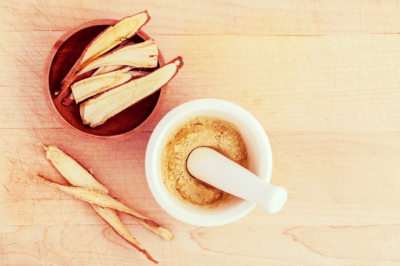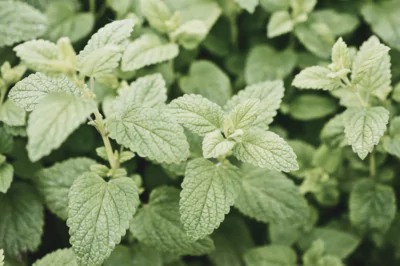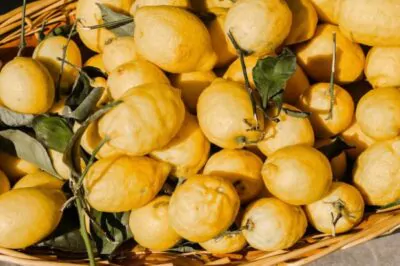Table of Contents[Hide][Show]
Raise your hand if you get stressed. If you don’t have your hand up I don’t believe you. Stress is a natural part of life and a little bit of stress is actually really good for us because it helps us to stay motivated. Too much stress over a long period of time, though, can have some pretty negative impacts on your overall health—like adrenal fatigue and compromised immune function.
Fortunately for us, there is a class of herbs that are specific to helping with this kind of stress-induced illness. Adaptogens! In the simplest terms, an adaptogen is a herb that helps you adapt to the environment that you’re in. Yeah, it’s basically in the name.
There have been several definitions of adaptogens over time, but the best functional definition we have comes from Doctors Brekhman and Dardymov in 1968. They narrowed down the three things that every adaptogen has in common:
- Adaptogens are nontoxic to the person taking them. They have very few side effects and can be used long term without major risk.
- Adaptogens produce a nonspecific response within the body that help to increase the adaptive capacity to the different stresses in life.
- Adaptogens help maintain homeostasis long term by possessing the ability to regulate (not just increase or decrease) metabolic and neuroendocrine function.
Adaptogens for Adrenal Support
The effects of adaptogenic herbs have been well-documented for thousands of years in Chinese and Ayurvedic medicine, and more recently in Western scientific studies. We don’t know exactly how they work yet but what we do know is that all adaptogens work their magic directly on the HPA axis (hypothalamic-pituitary-adrenal), which means that they have a direct effect on how our stress hormones are released and regulated in our bodies. They also have a general balancing effect on regulatory systems, including the metabolic and immune system. This is why herbalists use adaptogens for adrenal support so often.
That being said, there are quite a few of them and they’re not all the same — some work better than others for certain people. It’s important to research your adaptogens and to try out a few to find the one or two that work best for you.
Choosing the Right Adaptogen
Luckily, it’s pretty difficult to choose the ‘wrong’ adaptogen because they all help the body deal with stress and most of the time they increase your overall vitality along with it.
It is, however, possible to choose the right adaptogen for yourself. Each one has its own niche in the healing world and when you start to work with the different adaptogens, you’ll notice subtle differences in them. Soon you’ll be able to find the perfect ally for every situation.
A really good tip for those of you interested in creating herbal formulations is to choose your adaptogen first. Though adaptogens have a nonspecific effect on the whole body, they often have other specific actions associated with them. Sometimes they have an affinity towards a certain organ that makes them just right for the chronic issue that you’re working with.
Adaptogens are long-term herbs, so choosing the right one can help set the tone for your whole treatment strategy and give you some guidance on the other herbs you might want to start using.
Some Good Adaptogenic Herb Friends to Know
The list of benefits for these herbal friends is so long that they could each have their own articles like two of our favorites, reishi and ashwagandha. Both are great examples of adaptogens and they make excellent “go to” options if you’re looking for long-term immune and stamina boosting herbs.
You can trust your adaptogen, no matter which one you choose, to work on your regulatory processes, so choosing your herb based on its other attributes is a great way to get the best benefits. Here’s a good place to start:
Aralia – An Adaptogen for the Lungs
Let’s say you have asthma with a lot of unproductive coughing. Any number of adaptogens will work well here but why not work with an adaptogen that has an affinity to the lungs—and maybe with a secondary actions such as warming and expectorant.
You want an adaptogen that will add strength to the lungs and bring up any trapped phlegm, while also helping the body adapt to the environmental stress that could be bringing on the asthma to begin with.
Remember that your adaptogen is your long-term base for the treatment strategy, so choosing one that works on several levels will lend itself to your healing practice.
Aralia californica root is the herb that I would choose for the person in the example. This plant is an adaptogen with an affinity for the lungs and warming and expectorant properties.
Aralia is a gentle and persistent ally. Along with replenishing your vital energy with very little side effects, it is a first defense cough remedy during a cold and a long-term tonic to fight asthma and allergies. She finds a way to work deeply into the lungs and push out unwanted illness and deep-seated phlegm without being so pushy that you feel like you’re hacking up a lung.
Aralia root has a really lovely peppery taste that is perfect for honeys and cough syrups. Candied aralia root is amazing and easy to make (the hardest part is being patient!). You just need to get some high quality raw honey and put the fresh root into it. Wait several months and your aralia root will be a delicious candied treat and your honey will be loaded with antioxidants and ready to help you with your cough. The dried aralia leaves make a wonderful tea and the leaves are so large that it’s easy to collect enough to last for several months.
Astralagus – An Adaptogen that Builds Blood
Building blood is something you’ll hear often about in treatment strategies — it basically means that you want to increase the overall vitamin and mineral content coursing through the bloodstream, so you want to build up the body’s capacity to hold those vitamins and minerals. In general, you’ll want to work with herbs and diet here and it takes a long time to actually build up the blood. But there are adaptogens that can help.
Astragalus actually stimulates white blood cell and macrophage production in the blood. Astragalus is a super builder for the body in general — along with increasing your body’s metabolic processes, it really nourishes the cells and helps to protect the liver while boosting the immune system.
No matter where you are in the world, Astragalus will be in your local herb store. Tea is wonderful with astragalus in it, since it’s a root you can re-steep it all day — and it’ll give you more nutrients in the 3rd or 4th steep than in the first. It’s perfect to add to your mineral-rich soup broth or bone broth, too. In fact if you’re making anything in your crockpot at all, a stick of astragalus is a go-to! Your body will thank you!
A note of caution: Astragalus shouldn’t be taken during acute sickness. It can actually drive the infection deeper into your body and feed the illness.
Rhodiola – An Adaptogen for Heart Health
This goes along with blood building, but it’s distinctly different in that it’s focused on the blood pumper and not just what it’s pumping. Heart failure is a number one killer in our country so it’s important to think about heart health. Adaptogens can be seriously helpful for your heart.
Rhodiola rosea is one of the most researched adaptogens out there, probably because it has been used for centuries by royalty in China and Siberia to prolong life. It protects the heart against irregular beats and is considered highly cardioprotective. This makes it a go-to for formulas to combat arrhythmia and for people that are very physically active.
Along with being amazing for the heart, rhodiola is considered both a stimulant and a nervine, depending on what the body needs, and has often been used as an antidepressant. It has been used with ADHD, head injuries, altitude sickness, and neuro-disorders.
The way I know rhodiola is as a tincture. It only grows very high in the mountains so it’s pretty rare to find the fresh plant to use it in a different way. If you do happen to be walking through the mountains in northern Siberia and you find some rhodiola (or you have access to the root), you’ll want to boil a teaspoon for about 15 minutes in a cup of water and then let it steep for another 45 minutes – do that 1-3 times each day.
A safety concern to note is that people that are bipolar or generally paranoid could have increased manic episodes. I have seen this first hand and I notice that the people that don’t love rhodiola are the people that don’t love stimulants in general. I would describe them as “generally keyed up.”
Licorice Root – An Adaptogen for Digestive Health
We have noted many times before that all illness begins in the gut. The digestion system is how we fuel our body and it is the main place that we bring external things internally, so eating is a pretty dangerous part of life and we can certainly get ourselves into trouble.
If you’re working with someone and you’re seeing that they could use a digestive boost, consider licorice root for your adaptogen. Something like 90% of all Chinese medicine formulas contain licorice root because it has awesome health benefits, it tastes good (especially compared to a lot of other Chinese herbs), and it has a synergistic quality that helps to increase the potency of the formula. Licorice has been used as a sweet food source in communities all over the world for a very long time.
Licorice root is in my go-to list for chronic acid-reflux, digestive upset, and blood sugar balancing. It’s very juicy and demulcent so if you’re working with any kind of internal mucosa dryness, licorice root could be the answer. It has antiviral, antihistamine, and antioxidant properties making it a great addition to a diet that could be harmful or potentially inflammatory.
I love to give licorice sticks to people that have sugar cravings to chew on. It cuts the craving AND balances their blood sugar (which makes me feel tricky). In a tincture formula, licorice can enhance the flavor significantly, so look for it on the ingredient list if you want some sweetness!
I have also used licorice as a powder with other herbs to add to smoothies and well as a cut and sifted root to add to a tea blend. It’s probably one of the most versatile adaptogens in terms of use.
Some notes of caution with licorice: it’s very safe for short term use but if you’re using it long term as a major part of your formula, you’ll want to check the contraindications against any medications that you’re taking or any potential illnesses that you’re experiencing.
Shatavari – An Adaptogen for Reproductive Health
This is especially helpful for women to know about because we go through so many changes throughout our lifetimes. It’s such a large part of our lives that keeping up with reproductive health can make a huge impact on our overall health.
Shatavari is so invigorating and restorative for our reproductive health that the name shatavari actually translates to, “she who has hundreds of husbands.” Shatavari increases fertility, enhances sensuality, and can stop menopause symptoms in their tracks. That makes it useful for every maiden, mother, and crone out there — it also makes it my favorite adaptogen for building formulas for women.
Shatavari is extremely nutritive and is jam-packed with vitamins, minerals, and antioxidants, so it’s wonderful for people dealing with chronic fatigue, anemia, and urinary cases. It is also a soothing demulcent so it could certainly be added to aid in healing digestive issues.
Shatavari is what is considered a ‘yin tonic’ which means that its gentle nature lets you feel more comfortable working with the softer side of things. My mother likes it as a powder to add to drinks. I personally think it serves us best as a tea made in large amounts to drink throughout the week. I have travelled with it and taken it as a tincture as well though and it is just as effective.
I add shatavari to my favorite adaptogenic tea recipe. It adds a sweet creaminess and a really nice energy boost that doesn’t have a come down like coffee can. Look out for that recipe on the blog soon!
You can use adaptogens for adrenal support that, over time, you will really notice a difference. I hope you found a new herbal ally (or maybe gained a new appreciation for one that you were already using).








Where should one find all of these herbs and teas?
Your local herbal shop or Mountain Rose Herbs!